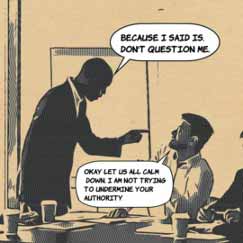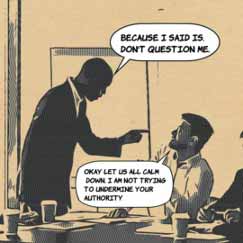When you hear this phrase, what comes to mind is an argument between a parent and a child. Most parents use it when they don’t know what to say or they feel that the reason they will give will not make sense to the child.
Other people use this phrase for the same reasons as others. If you are among those who are told this sentence I have a few replies that you can use.
Many of them may be considered respect but there are few mild ones. Let’s check them out:
- That’s not a good enough reason
- And who are you
- Fine
- Then I am forced to act in this matter
- Well I don’t care what you said
- Okay let’s calm down
- You are right. I am sorry for questioning you
- If you say so
- You’re the boss.
- No problem
- Whatever makes you happy
- I fail to get the argument you are attempting to make
- Now that’s just sus
- Okay boomer
- Really? Got nothing else?
- Not an exact answer but okay
That’s not a good enough reason
And it isn’t because it doesn’t respond to your inquiry. They might feel you are being rude but you deserve an answer, one that will aid you in understanding the whole situation better.
It is very good as a savage reply and they will feel embarrassed.
And who are you?
For someone who you don’t regard their authority or someone who feels that they are in some position of authority, do they have the right to boss you around?
This will tell them that you don’t care if they said it or not. They are not a good enough source of information for you and they should piss you off.
Fine

This reply can either be said angrily to mean that even though you don’t want to do as they said just because they said it, you will do it because you have no other choice or you just want to avoid aggravating the situation.
If you say it calmly then you accept this phrase as a reply to whatever you asked, though it’s not the right answer.
Then I am forced to act in this manner
You can say this with a smirk on your face to get them angry or angrier because even if you do whatever they want you to do, you don’t respect them.
The next thing is to do whatever they tell you to do in such a nice and polite manner that they start to feel foolish.
Well I don’t care what you said
This is a highly risky reaction since you may get into a lot of problems if the person you are speaking to is higher than you.
If you really are right and trying to show them you don’t care about who they are, then you can use this reply and then continue what you were engaged in.
Okay let’s calm down
Maybe one wrong line led to this very worked-up moment or you tried to ask a question, “why” and they think you are challenging them, not looking for an honest answer. This reply will help them to cool off.
When you say calm down, they will know you don’t want to pick a fight and that they are overreacting already. If it is someone willing to be reasonable, they would call down quickly and you can talk it out.
If it is someone who is not willing to listen and understand, this reply might make things worse. For example,
A: I want you to send this to our publishing team
B: There are mistakes all over this memo
A: Then fix it and take it for publishing
B: Why. It’s not my place to handle such matters
A: Well, because I said so
B: Okay. Let’s calm down
A: Are you saying that I can’t control my temper? Are you challenging my authority? The management will hear this!
B: No! No! It hasn’t got to this.
You are right. I am sorry for questioning you

This reply is just like the one above except it will immediately make the other person feel better because there is no way that this can go wrong (well, unless you say it in a rude tone).
Accepting whatever they have said will make them feel like they have just won a war, and allowing them to enjoy that no matter how silly it may seem is just being mature and letting it roll off your back.
If you say so
This reply is a bit nonchalant so it will be an indifferent reply. You don’t want trouble or you don’t even want to be in that situation at all so you just give in to whatever they say, uncaring of how it will affect others.
It’s also genius because it is also the word “say” that was in the phrase they say. If you say this with a shrug they will get the full message.
You’re the boss

If they ever felt you were challenging them, this will make them change their minds completely.
This reply not only tells them that you respect them as the boss or as someone in a position of authority but also says, I am going to do what you said not just because you said so but because the boss says so. If they were enraged before, this should appease them.
No problem
What may seem like a big deal to them is not a big deal to you. In fact, this reply seems to focus on what you were told or asked to do rather than whether it’s right or wrong.
They might have asked you to move a mountain or light a candle, it doesn’t make a difference. The fight they might want to pick doesn’t concern you. You can also say yeah boss, or sure thing or alright I’m on it.
Whatever makes you happy
This reply is used to say that you agree with what they are saying but only because peace would reign and there would be no problems.
It also subtly tells them that you are not happy with the decision but you would go through with it anyway. If you say this mumbling and angrily, it will sound sarcastic.
If you say it sadly, you might get some attention and get your way
I fail to get the argument you are attempting to make
This response is not angry, it still doesn’t just accept what you’ve been told to do. When it is obvious that this is not the greatest course of action or decision, it is being questioned as to why they have made this choice.
It’s a very reasonable reply and anyone willing to listen will understand it perfectly well.
On the other hand, if they don’t want to listen or understand -which is what most likely got you to this situation now – they would still be offended.
Now that’s just sus
Sus means suspicious, as in that reason “because I said so” is not clear at all and makes you feel suspicious.
Saying it to them tells them you don’t trust them and you would please like a better reason for what they are asking you to do.
They might not give you a better reason – that’s why they used this reply in the first place – but you have told them just how you feel and they will keep it in mind.
Okay Boomer

Just in case you don’t know, boomers are those in their 50s, 60s, and 70s. This reply works well if you are a gen z or millennial kid.
It tells them that you feel they’re being authoritative, and unreasonable and you don’t like how they are acting and talking.
It will come off as disrespectful so get ready for a scene, but you have told them how you feel even if you are doing what they asked you to do.
Really? Got nothing else?
A dumb reason like “because I said so” is used when people just don’t know what else to say or have no good enough reason so this reply just judges their reason with disappointment.
It is saying you feel they could have gone for something better no matter how silly it might have been.
Not an exact answer but okay
This is the kind of reply you say to yourself but loud enough for them to hear so it sounds like you are thinking out loud.
If you say it in a pondering tone they won’t say you were challenging or disrespecting them. It will seem like you are thinking about the task more than why they should give you that answer.
Conclusion
While people are encouraged not to use the phrase, you can use some of those replies to tell people that they can’t boss you around because they feel like it.
If common sense won’t make them stop, the replies will and the world will be a happier place.